John Kerry Cochairs Biden Climate Plan
Air Date: Week of October 2, 2020
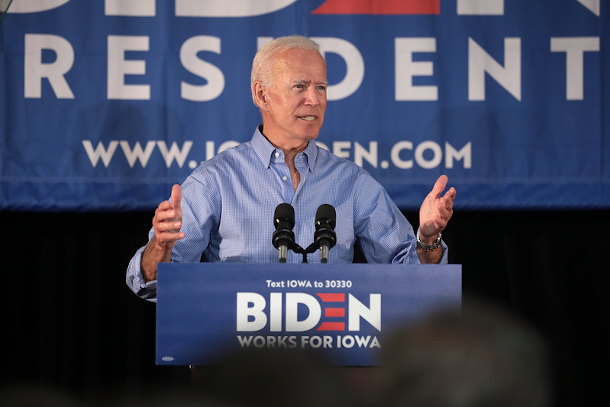
Democratic Presidential nominee Joe Biden speaking with Iowa voters. (Photo: Gage Skidmore, Flickr, CC BY-SA 2.0)
Joe Biden is offering a $2 trillion climate plan as part of his presidential campaign’s “Build Back Better” economic recovery agenda. Former Secretary of State John Kerry, cochair of the Biden Climate Task Force, joins Host Steve Curwood to talk about how the Biden campaign is connecting its climate ambitions with public health crises and the worst economic crisis since the Great Depression. They also discuss Joe Biden’s stances on nuclear energy and fracking, President Trump’s lack of climate leadership, and the urgency of voting with climate in mind this November.
Transcript
CURWOOD: During this presidential campaign we’ve invited Joe Biden and Donald Trump to come on the show or send a surrogate to discuss their positions on climate change. The Trump campaign has yet to respond to repeated requests but John Kerry, former Secretary of state and himself a democratic nominee for president in 2004 joins us now on behalf of the Biden campaign. Along with New York democratic congresswoman Alexandria Ocasio-Cortez, Secretary Kerry cochaired the Biden-Sanders climate unity task force. This task force crafted a $2 trillion climate plan for Biden which aims to achieve a 100% clean energy economy and net-zero emissions no later than mid-century. Welcome back to Living on Earth, Secretary Kerry!
KERRY: Happy to be with you. Thanks for having me.
CURWOOD: Secretary Kerry, how important do you consider Joe Biden's $2 trillion climate change plan is to the campaign as a whole?
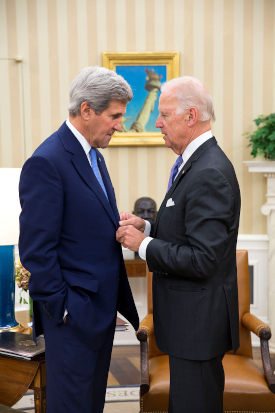
Former Vice President Joe Biden speaking with Secretary of State John Kerry in the Oval Office in October 2014. (Photo: Pete Souza, Official White House Photo)
KERRY: Critical. Absolutely critical because when he is elected, he is going to be facing the biggest economic crisis we've had since Franklin Roosevelt in 1932; I think the Vice President knows that. So building back from COVID-19, and from the position we find ourselves in will be hugely advantaged by building out a energy grid, by doing what we need to do to incentivize the shift to electric, to solar, to wind, to hydrogen. There are huge options available to us that will kick the economy into gear. And the Vice President is deadly serious about getting government to focus on this, but he doesn't view it as the whole solution. The private sector has got to step up; innovation, development, research, infrastructure, those are the key elements. And they happen to be the key elements of recovery, too.
CURWOOD: How excited are you about this? You've been concerned about the climate for decades, literally. How does the, the Biden plan compare to your vision of what you think needs to be done?
KERRY: I think it's the best, detailed, climate plan, climate crisis agenda that has been put forward by any Presidential candidate to date. And I'm extremely excited about it, because I see in it leadership restored for America on an international basis, I see in it our dealing with a whole bunch of Americans who've been on the wrong end of environmental decisions for a long period of time. You look at the problem in the Bronx, for instance, of environmentally induced asthma. The biggest cause of children being hospitalized in America in the summer, is environmentally induced asthma. And part of it is because diesel trucks get routed through communities that don't have the political power to resist; more often than not, minority communities. And so he'll be addressing a whole group of concerns for the average citizen in our country that can be addressed through a combined economic government--private sector partnership. I mean, Joe Biden is talking not just about $2 trillion for infrastructure development, but he's going to make sure we have carbon free power by the year 2035. That's an ambitious but achievable target. And he's going to work with the power companies, utilities and others to achieve that. He is going to have 500 million solar panels that are going to be deployed during the course of five years. Transition of buses, from internal combustion engine to electric. I mean, there are many, many different things we can do. And nobody, none of your listeners, I hope, will sit there and say, Well, wait a minute, that, that's, that's going to hurt the economy, that's going to cost me my job. No! No, no, it's not! It's going to, in fact, lower the price of goods over time, it's going to provide tens of millions of jobs in our country alone. And it is going to provide the ability to be able to have better quality of life because there'll be less particulates in the air, less emissions -- which are pollution. Emissions is too nice a word for pollution. People don't want to breathe dirty air and drink, you know, polluted water. And the reality is that that's what we've been doing for years because we haven't been paying attention.
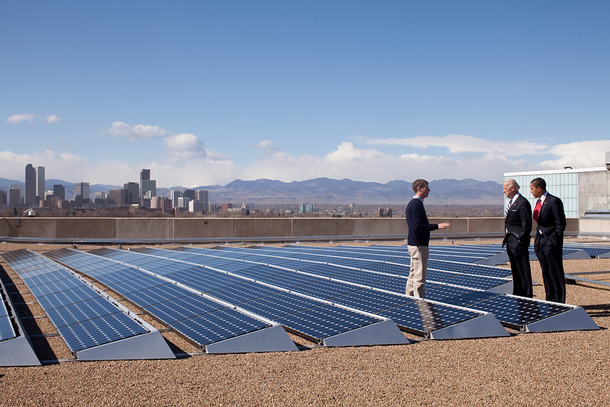
Former President Barack Obama and Vice President Joe Biden discuss solar energy in Denver, Colorado. Biden calls for installing 500 million solar panels within five years. (Photo: Pete Souza, Official White House Photo)
CURWOOD: Right now, I think it's fair to say that a lot of environmental activists are very concerned about the general election, want to see Vice President Biden elected. But the day after he takes office, they're going to look at your climate plan, which has fracking, nuclear power, carbon capture and storage, things that some environmental activists have said over the years are steps backwards instead of forwards.
KERRY: Steve, it leaves the possibility of nuclear power, it doesn't have nuclear power, it just doesn't eliminate it. And if the next generation of modular power plants can prove they are economical, and they solve the problems of meltdown and waste, they may earn themselves a place at the table. What Joe is doing is not eliminating automatically things, because it is zero emissions. If somebody comes up with a way of doing it safe, sound, deliverable, priced right, I think a lot of people would embrace it. We have 20% of our power today in America is nuclear; 70% of France's power is nuclear. So I think it's a question of not eliminating. So his first choice is solar, wind, renewables, alternative, move in a clean direction. Now on the fracking, what he has said is, on existing fracking, that is in private land, he's not going to interfere with the already existing levels, partly because we need the natural gas as a transition fuel as we move into the new technologies. And we can't just cut it off today or tomorrow, and I think reasonable people understand that. So we have to have this transition period, but we have to do it fast enough that we're not cutting our throats while we're in the sort of delay period, we got to move rapidly. That's what Joe Biden understands.
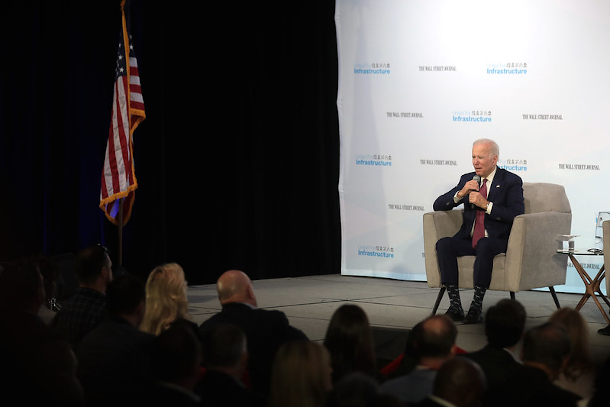
Joe Biden discussed his clean energy ideas at the Moving America Forward Forum on infrastructure in Las Vegas, Nevada in February 2020. (Photo: Gage Skidmore, Flickr, CC BY-SA 2.0)
CURWOOD: But what about more infrastructure for, for natural gas, for fracking?
KERRY: So that's dangerous. I'm not for building up, I personally would, would not want to see us build a whole lot of new infrastructure. Because then as you make the transition, the pressures will come, as they automatically do, politically, "hey, you know, we can't transition our jobs, etc," number one. And number two, you'll have what you call stranded assets, which the economy doesn't want to do, I mean you want to try to minimize that exposure. So we're doing it, but people need to embrace the possibilities of transitioning and providing many more new jobs, better jobs, that actually help us solve this crisis.
CURWOOD: To what extent does the Biden climate plan look at both forestry here in the United States, but perhaps more importantly, at forests around the world as a way to cope with the climate emergency?
KERRY: The reality is the Biden plan is focused on agriculture, regenerative agriculture, it's focused on building out what we call sinks. Sinks are those things or places where carbon dioxide gets consumed. The ocean is a sink, carbon dioxide, maybe 50, 60% of our heat and carbon goes into the ocean. It's a great storage center. Well, so is the rainforest in Amazon. And Joe Biden has called for practices by other countries that are going to respect the international goals here of sustainability, and sustainability requires us to protect those forests. But his largest priority will remain getting all nations, particularly developed nations, back to and beyond the Paris Agreement. I had the privilege of leading our negotiations in Paris, and I can tell you that what helped make that happen was bringing China to the table, working with India, working with Australia, Saudi Arabia, Brazil, other countries. We exercised, I think, strong diplomacy, strong leadership. In the end, 196 countries signed on to that agreement. Only Donald Trump, he's the only President in the whole world who has pulled out of the Paris Agreement. And he has done so without any scientific rationale. He's done so, in fact, lying to the American people about the burden that it put on America, when in fact, the program that we adopted was written by Americans, for Americans, including Fortune 500 companies, Big Oil, they were all at the table. The largest companies in America helped to write our plan. And it does not place a burden on America, it places before us a huge opportunity.
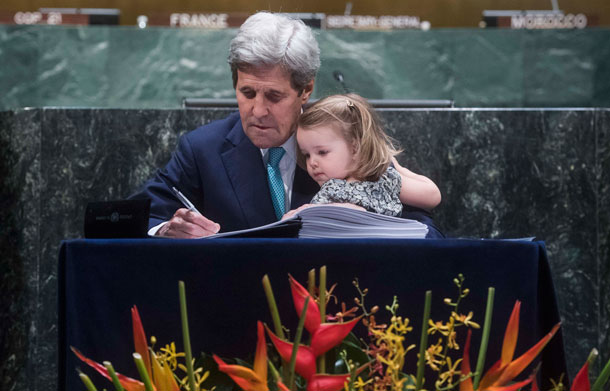
On Earth Day, April 22, 2016, then US Secretary of State John Kerry signed the Paris Agreement at the United Nations as his granddaughter Isabelle looked on. Just over a year later, President Trump announced he was withdrawing the US from the landmark climate change agreement. (Photo: UN Photo/Amanda Voisard, Flickr, CC BY-NC-ND 2.0)
CURWOOD: The other day, China announced a goal of going carbon neutral by 2060. How could a new administration rebuild the US-China relationship to lead the world on setting strong climate targets? Because, 2060 is necessary, but not sufficient, I would think.
KERRY: I couldn't agree with you more. I welcome the fact that they've taken awareness of it and that they've targeted 2060. But that doesn't work. It doesn't work for the rest of the world. China is about to bring online, some 21 Gigatons of coal-fired power. That doesn't work for us, doesn't work for the whole world. It may work for China in the short term, but it's not even going to work for China in the long term. We worked very effectively with China during the Obama-Biden administration. And Joe Biden has a very strong relationship with President Xi. He knows how to be tough, but he also knows how to get things done. Unlike President Trump, who hasn't gotten anything done with them, except to raise the decibels and wind up making food products much more expensive for American farmers and making those, those farmers' lives quite difficult over the last three years.
CURWOOD: Let me ask you about a coalition that you called World War Zero, just a couple of months before the coronavirus pandemic hit; remind me of World War Zero's mission and how the pandemic has now reshaped your on the ground work.
KERRY: World War Zero is a group that we brought together on a bipartisan basis. I was working with former Republican Governor Arnold Schwarzenegger, with former Governor Christie Todd Whitman of New Jersey, with former defense secretaries, Senators Bill Cohen and Chuck Hagel. A whole bunch of people came together saying, we've got to talk differently about climate change, crisis. We can't be polarized. And we can't let actions we know we need to take be prevented because we can't build a majority for this. So we came together with a view to trying to help people realize, as unlikely allies -- I mean, Arnold Schwarzenegger, John Kerry, these folks, they're unlikely allies. But they are allies on this climate crisis. And they came together to urge people to vote. We're not telling people how but we're trying to urge people that climate crisis is worth finding the person that you think is going to do something about it. And we're asking you to vote for that person. So it's World War Zero -- it's World, because the whole world has to be at the table involved in this. It's War, because, unfortunately, some people have decided to declare war on science, war on facts, war on evidence. And we're going to push back against that. And it's Zero, because zero is the target figure we must reach by 2050, we have to have a net zero carbon economy, and frankly, I think sooner than that. And we've had many, many, many digital conversations with people, we've had incredible learning sessions where we've had different scientists, we had a glaciologist the other day talking about what's happening to Greenland and Antarctica, and we're trying to help inform people, so they can go out and make an informed vote. But the key, the key is this: in 2016, when Trump was elected, only 55.6% of eligible Americans decided to go vote. That's horrible in a democracy. And the truth is that of the young people, 18 to 25, only 19% went to vote. So if we're going to win our future, if we're going to make our democracy work, you got to vote. Vote climate, and vote for people, whatever party or walk of life they're in, who are going to help us address this crisis.
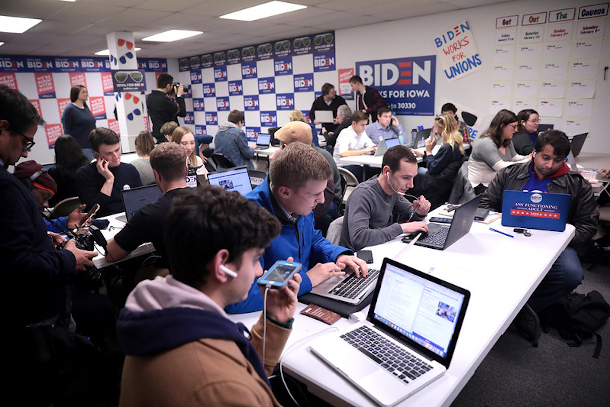
Supporters at a phone bank at Joe Biden's presidential campaign office in Des Moines, Iowa. (Photo: Gage Skidmore, Flickr, CC BY-SA 2.0)
CURWOOD: John Kerry is former Secretary of State and cochair of candidate Joe Biden's climate task force. Thanks so much for taking the time with us today, Mr. Secretary.
KERRY: My honor to be with you, thank you so much. Appreciate it.
Links
Read about Joe Biden’s climate plan
About the Biden-Sanders Climate Change Task Force
Listen to our primary campaign coverage of Biden on climate
Learn more about World War Zero
ICYMI: Our extended interview with John Kerry on his memoir “Every Day Is Extra”
Living on Earth wants to hear from you!
Living on Earth
62 Calef Highway, Suite 212
Lee, NH 03861
Telephone: 617-287-4121
E-mail: comments@loe.org
Newsletter [Click here]
Donate to Living on Earth!
Living on Earth is an independent media program and relies entirely on contributions from listeners and institutions supporting public service. Please donate now to preserve an independent environmental voice.
NewsletterLiving on Earth offers a weekly delivery of the show's rundown to your mailbox. Sign up for our newsletter today!
 Sailors For The Sea: Be the change you want to sea.
Sailors For The Sea: Be the change you want to sea.
 The Grantham Foundation for the Protection of the Environment: Committed to protecting and improving the health of the global environment.
The Grantham Foundation for the Protection of the Environment: Committed to protecting and improving the health of the global environment.
 Contribute to Living on Earth and receive, as our gift to you, an archival print of one of Mark Seth Lender's extraordinary wildlife photographs. Follow the link to see Mark's current collection of photographs.
Contribute to Living on Earth and receive, as our gift to you, an archival print of one of Mark Seth Lender's extraordinary wildlife photographs. Follow the link to see Mark's current collection of photographs.
 Buy a signed copy of Mark Seth Lender's book Smeagull the Seagull & support Living on Earth
Buy a signed copy of Mark Seth Lender's book Smeagull the Seagull & support Living on Earth

